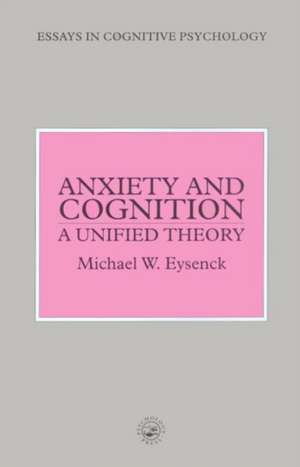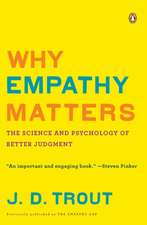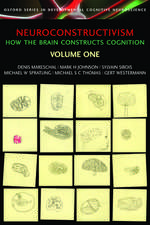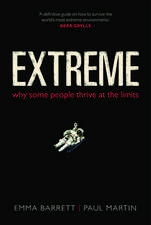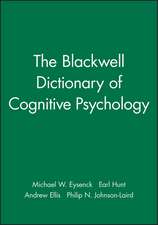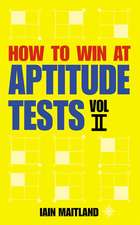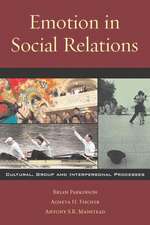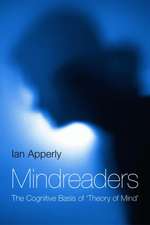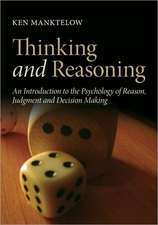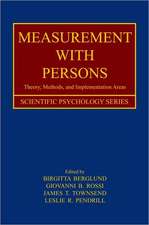Anxiety and Cognition: A Unified Theory: Essays in Cognitive Psychology
Autor Michael Eysencken Limba Engleză Hardback – 14 mai 1997
| Toate formatele și edițiile | Preț | Express |
|---|---|---|
| Paperback (1) | 462.60 lei 6-8 săpt. | |
| Taylor & Francis – 25 iun 2015 | 462.60 lei 6-8 săpt. | |
| Hardback (1) | 999.19 lei 6-8 săpt. | |
| Taylor & Francis – 14 mai 1997 | 999.19 lei 6-8 săpt. |
Din seria Essays in Cognitive Psychology
-
 Preț: 386.42 lei
Preț: 386.42 lei - 13%
 Preț: 348.02 lei
Preț: 348.02 lei -
 Preț: 461.50 lei
Preț: 461.50 lei -
 Preț: 467.44 lei
Preț: 467.44 lei -
 Preț: 459.71 lei
Preț: 459.71 lei - 22%
 Preț: 369.82 lei
Preț: 369.82 lei -
 Preț: 410.88 lei
Preț: 410.88 lei - 15%
 Preț: 541.72 lei
Preț: 541.72 lei - 18%
 Preț: 998.88 lei
Preț: 998.88 lei - 13%
 Preț: 302.64 lei
Preț: 302.64 lei - 15%
 Preț: 423.28 lei
Preț: 423.28 lei -
 Preț: 482.53 lei
Preț: 482.53 lei -
 Preț: 480.62 lei
Preț: 480.62 lei -
 Preț: 482.94 lei
Preț: 482.94 lei - 48%
 Preț: 233.06 lei
Preț: 233.06 lei -
 Preț: 462.60 lei
Preț: 462.60 lei - 42%
 Preț: 233.06 lei
Preț: 233.06 lei - 18%
 Preț: 1000.27 lei
Preț: 1000.27 lei -
 Preț: 393.63 lei
Preț: 393.63 lei - 41%
 Preț: 236.05 lei
Preț: 236.05 lei -
 Preț: 482.35 lei
Preț: 482.35 lei - 26%
 Preț: 765.23 lei
Preț: 765.23 lei -
 Preț: 460.69 lei
Preț: 460.69 lei -
 Preț: 343.77 lei
Preț: 343.77 lei -
 Preț: 314.59 lei
Preț: 314.59 lei -
 Preț: 190.51 lei
Preț: 190.51 lei - 18%
 Preț: 1013.72 lei
Preț: 1013.72 lei - 17%
 Preț: 126.66 lei
Preț: 126.66 lei -
 Preț: 482.53 lei
Preț: 482.53 lei -
 Preț: 483.49 lei
Preț: 483.49 lei - 16%
 Preț: 130.21 lei
Preț: 130.21 lei -
 Preț: 465.39 lei
Preț: 465.39 lei - 31%
 Preț: 765.45 lei
Preț: 765.45 lei -
 Preț: 483.49 lei
Preț: 483.49 lei
Preț: 999.19 lei
Preț vechi: 1218.53 lei
-18% Nou
Puncte Express: 1499
Preț estimativ în valută:
191.19€ • 200.16$ • 158.20£
191.19€ • 200.16$ • 158.20£
Carte tipărită la comandă
Livrare economică 05-19 aprilie
Preluare comenzi: 021 569.72.76
Specificații
ISBN-13: 9780863774782
ISBN-10: 0863774784
Pagini: 208
Ilustrații: references, index
Dimensiuni: 152 x 229 x 21 mm
Greutate: 0.42 kg
Ediția:1
Editura: Taylor & Francis
Colecția Psychology Press
Seria Essays in Cognitive Psychology
Locul publicării:Oxford, United Kingdom
ISBN-10: 0863774784
Pagini: 208
Ilustrații: references, index
Dimensiuni: 152 x 229 x 21 mm
Greutate: 0.42 kg
Ediția:1
Editura: Taylor & Francis
Colecția Psychology Press
Seria Essays in Cognitive Psychology
Locul publicării:Oxford, United Kingdom
Public țintă
ProfessionalCuprins
Theories of Trait Anxiety. A Four-factor Theory of Anxiety. A New Theory of Trait Anxiety. Theoretical Approaches to Clinical Anxiety. Clinical Experimental Evidence. Cognitive-behaviour Therapy.
Recenzii
This interesting monograph, written by one of the world's leading authorities on cognition and emotion, provides a persuasive synthesis of cutting edge research on the cognitive aspects of anxiety. In particular, Professor Eysenck's emphasis on the "repressor" processing style is likely to have a major impact on work in this area. Researchers in personality psychology and experimental psychopathology will surely benefit by reading this book. - Richard J. McNally (Harvard University)
I enjoyed reading this book - it was very interesting and written in a very clear and accessible style. It provides a careful review of a wide range of literature dealing with anxiety primarily from a cognitive perspective. The four factor theory provides a most useful framework for considering the complex and divergent literature on information processing biases in nonclinical and clinical anxiety, and on cognitive therapy for anxiety disorders. - Karin Mogg (University of Cambridge)
This book represents an admirable attempt to integrate experimental research on the cognitive aspects of anxiety with the clinical application of Cognitive Behavioural Therapy (CBT) to the treatment of anxiety disorders...An especially useful feature is the highlighting of some unique clinical problems that need to be addressed by cognitive models of anxiety...a very nice summary of experimental approaches to the clinical aspects of the main anxiety disorders. - Elaine Fox (University of Essex)
I enjoyed reading this book - it was very interesting and written in a very clear and accessible style. It provides a careful review of a wide range of literature dealing with anxiety primarily from a cognitive perspective. The four factor theory provides a most useful framework for considering the complex and divergent literature on information processing biases in nonclinical and clinical anxiety, and on cognitive therapy for anxiety disorders. - Karin Mogg (University of Cambridge)
This book represents an admirable attempt to integrate experimental research on the cognitive aspects of anxiety with the clinical application of Cognitive Behavioural Therapy (CBT) to the treatment of anxiety disorders...An especially useful feature is the highlighting of some unique clinical problems that need to be addressed by cognitive models of anxiety...a very nice summary of experimental approaches to the clinical aspects of the main anxiety disorders. - Elaine Fox (University of Essex)
Notă biografică
Royal Holloway University of London.
Descriere
This text argues that there are three major approaches to anxiety: anxiety as an emotional state; trait anxiety as a dimension of personality; and anxiety as a set of disorders.
